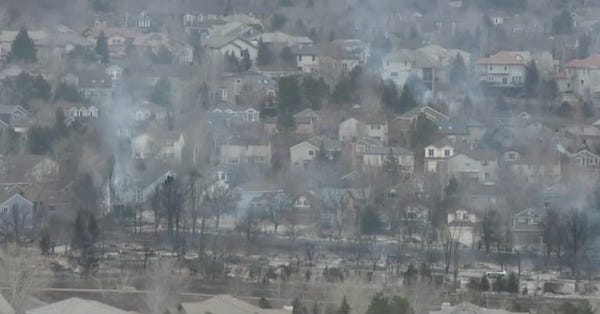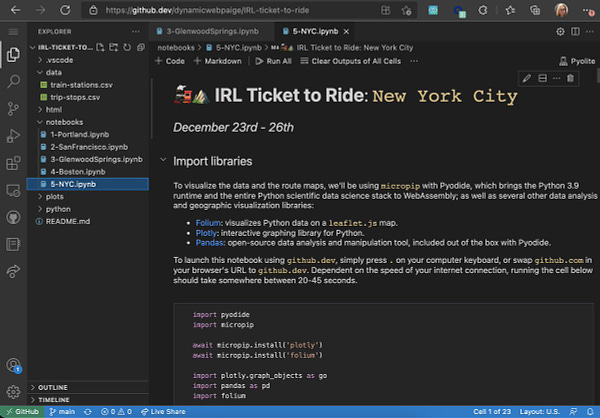Is machine learning the new oil?
Brief aside — for those of you who watched the national news this last week and know about the Marshall fire in Superior, Colorado that is just west of Broomfield, Colorado where I reside. Thankfully we are safe and did not have to evacuate our home. About 30,000 people did end up having to evacuate very quickly and thousands of homes were destroyed. We had to take a moment to reflect on what was worth putting in the car. You can imagine that the kids, dogs, laptops, passports/papers, and a few pieces of family art were on the list. Make sure you have a family plan in the event of a disaster. Several inches of fresh snow have since fallen here in Colorado and the fire is contained at this point.
A brand new year has arrived: 2022. It is barely 7 hours old at this point. A lot of hype exists for the promise of 2022. Hype happens for a variety of reasons and one of them is certainly marketing. The marketing engine is real. For a long time the phrase “big data” was the soupe du jour of a lot of marketing buzzword engine within the business world. Another phrase you will see used a lot in the hype machine is invoked by declaring, “data is the new oil.” Just for fun I dropped that phrase back into Google Trends to see where it started to appear and the frequency over time.[1] That search was filtered to 2004 to present and the phrase was in quotes. By following that link you would see that 39 references to that phrase popped up during August of 2011. For the most part the phrase just keeps being used for the next decade. Taking that one step further, a quick search on Google Trends for "ML is the new oil" or "machine learning is the new oil" returned “Hmm, your search doesn't have enough data to show here.” Removing the quotes did not really change the returned values either.[2]
You can imagine that my next thoughts were to go back and dig into what happened back in 2011 to kick off all the discussion of data being the new oil and a bit of consideration to why that conversation did not directly extend to machine learning. The hoard of internet investigators seem conflicted on this one about how Clive Humby may have said this back in 2006, but that ripple does now show up in Google Scholar or Google Trends.[3] I could not find the primary reference from 2006, but that might require some LexisNexis type investigation. The article that ended up catching my attention was titled, “Data was the new oil, until the oil caught fire.”[4] Danny Crichton pretty much sums up the current state of “data is the new oil” within the context of disaster response. That article was a decent read, but the one from Amol at Towards Data Science is probably the stronger analysis of the metaphor.[5] If you have a subscription to the Economist, then you could read more on the subject.[6] Years ago, during my high school debate and forensics research experiences The Economist publication was probably my favorite cover to cover read.
Back to my initial question for this post, “Is machine learning the new oil?,” and what it means within the context of the hype built up around big data. You can find a lot of references to machine learning within about twenty words of the “data is the new oil” metaphor being used. It seems like a few papers that are directly tied to using machine learning in the oil and gas industry do exist.[7] The ones I read this week did not really dig into the metaphor they looked at very tactical things like using satellite images to find oil spills, predicting future oil prices, and oil production monitoring. It turns out that machine learning is just a methodology used to interpret or do work on large datasets. Given that it is just a part of the overall data process the metaphor is not being extended to include machine learning directly into the phrasing. It does tend to show up at some point, but not the introductory use of the phrase.
Links and thoughts:
“Elon Musk: SpaceX, Mars, Tesla Autopilot, Self-Driving, Robotics, and AI | Lex Fridman Podcast #252”
This is from the TWIT network and I enjoyed it “Jack Dorsey's Web3 Rant”
After writing this weeks post I worked on some other things and watched Linus and Luke: “Alexa's Been NOT NICE - WAN Show December 31, 2021”
From Shannon Morse, “Tech Predictions for 2022 feat @Sara Dietschy @Tech Gear Talk @Novaspirit Tech @Liron Segev + MORE!”
Top 5 Tweets of the week:








Footnotes:
[1] Google. (n.d.). Explore. Google Trends. Retrieved January 7, 2022, from https://trends.google.com/trends/explore?date=all&geo=US&q=%22data%20is%20the%20new%20oil%22
[2] Google. (n.d.). Explore. Google Trends. Retrieved January 7, 2022, from https://trends.google.com/trends/explore?date=all&geo=US&q=machine%20learning%20new%20oil
[3] Arthur, C. (2013, August 23). Tech giants may be huge, but nothing matches big data. The Guardian. Retrieved January 7, 2022, from https://www.theguardian.com/technology/2013/aug/23/tech-giants-data
[4] Crichton, D. (2021, May 2). Data was the new oil, until the oil caught fire. TechCrunch. Retrieved January 7, 2022, from https://techcrunch.com/2021/05/02/data-was-the-new-oil-until-the-oil-caught-fire/
[5] Mavuduru, A. (2020, December 11). Is Data Really the New Oil in the 21st Century? Towards Data Science. Retrieved January 7, 2022, from https://towardsdatascience.com/is-data-really-the-new-oil-in-the-21st-century-17d014811b88
[6] The Economist. (2017, May 6). The world’s most valuable resource is no longer oil, but data. The Economist. Retrieved January 7, 2022, from https://www.economist.com/leaders/2017/05/06/the-worlds-most-valuable-resource-is-no-longer-oil-but-data
[7] Hajizadeh, Y. (2019, May). Machine learning in oil and gas; a SWOT analysis approach. Science Direct. Retrieved January 7, 2022, from https://www.sciencedirect.com/science/article/abs/pii/S0920410519301275
What’s next for The Lindahl Letter?
Week 51: What is scientific machine learning?
Week 52: That one with a machine learning post
Week 53: Machine learning interview questions
Week 54: What is a Chief AI Officer (CAIO)?
Week 55: Who is acquiring machine learning patents?
I’ll try to keep the what’s next list forward looking with at least five weeks of posts in planning or review. If you enjoyed reading this content, then please take a moment and share it with a friend.




